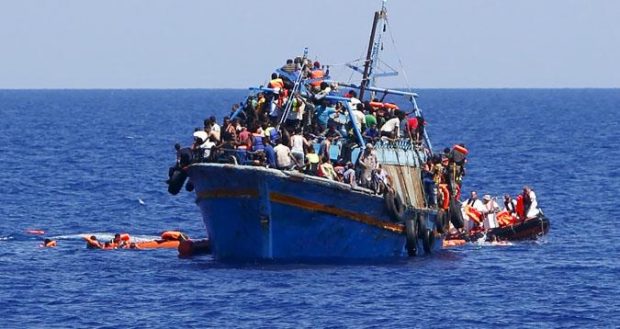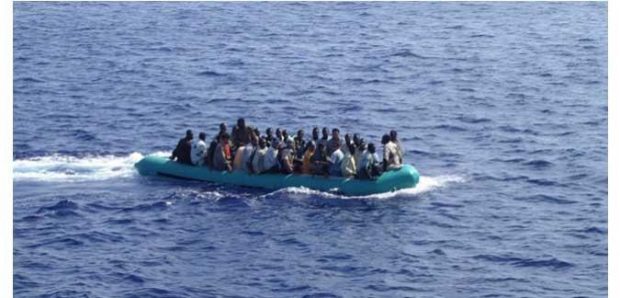Young women taking high risks to seek elusive fortune in Europe
In glamorizing ‘perfect’ life abroad, social media are affecting social norms
High school students typically dream how an academic edge will allow them to attend college and to aspire to find a suitable job that will help them ease into a tranquil life.
However, for Algerian student Yosra, obtaining the baccalaureate in June 2020 and starting the much-coveted university life, and eventually landing a job is not a temptation. Being smuggled into Europe before she turns 18 in March next year was. “Her focus right now is not studying and getting ready for the baccalaureate,” her aunt Najla said. “She believes that her studies will not take her far and that the best option is to reach Europe and start a new life there in which she can fulfill her dreams.”
Yosra has figured out that reaching France before she is 18 would help her being treated as a minor and accorded state support. Yosra who lost her father when she was young was able to convince her helpless mother easily about the merit of emigrating, be it clandestinely, in order to succeed in her life and then help her family. “Her mother said that she could not do much about her daughter’s obsession to cross the Mediterranean even if it meant serious risks to her life,” Najla said. “Whenever she was told about all kinds of threats, Yosra shrugged her shoulders, saying that she was confident she would make it. She is an athlete and she can manage the situation in case of disasters. It is incredible how the new generation thinks.” The aunt said that Yosra told them she was not afraid of possible failures and that she would not face the terrible experiences that made other smuggled people suffer once they arrived in Europe. “I can handle situations and I know that thanks to the assets I possess that I will succeed. All I need is around 800 euros to pay for the smuggling. I have to raise the money before March,” Yosra said.
Yosra’s case is not unique. Police officers in the north African countries of Morocco, Algeria, Tunisia, Libya, and Egypt have been regularly issuing reports they caught or rescued would-be emigrants being smuggled to Europe, mainly Spain, France, and Italy. What is remarkable is that an increasing number of young women, pregnant wives and mothers are being found in the small boats for the perilous journey.
Every year, thousands of people attempt to cross into Europe, giving to professional smugglers the money they often suffered severely to get or had to borrow under various phony explanations from friends and relatives. The risk is inevitably high, but the urge to make it to the dream destination is often higher. In Algeria, there were reports about two sisters Iman and Aisha who thought their great dream of leading happier and more fulfilling lives would only a few hours away if they embarked one evening in a pneumatic boat filled with other people, young and old, Algerians and foreigners, seeking their way clandestinely into Europe. The two sisters thought they could endure the pain of spending some horrible time in uncomfortable conditions and sitting with strangers, who included runaway convicts and suspects fleeing justice until they reached Europe in the early morning. However, their voyage ended five kilometers into the Mediterranean Sea when their boat capsized, causing the dreams of the two sisters for success in high-profile European universities and a good job to drown in the sea that separates Algeria from Europe. Yassin was deported from Spain to Tunisia, his home country, alongside thousands of other smugglers sent back by European police to their African countries.
Tunisian newspapers regularly report the busting of voyages organized by smugglers from coastal cities that are not far from Europe. Reports now refer causally to the presence of women in the boats or as smugglers overseeing voyages for hefty sums of money. In 2014, Italian police arrested a 20-year-old Tunisian woman for assisting 294 Africans in entering Italy illegally. Chehrazade, 27, comes from a popular neighborhood in Oran. She left her college classes after one year due to lack of funds to pay for her studies. She took up courses in hairdressing and accounting with the hope of landing a job. She ended up as a waitress serving clients in a tea salon and in a pizzeria. When she felt that she was gradually sliding into a world of morals that were not hers, she decided to ride the waves into Spain. Unfortunately for her, she was caught after 25 days and was repatriated.
The coast points from which smugglers operated their boats had names that should deter those with plans to reach Europe – The Red Point, the Beach of the Brave, the Sleeping Beach… There, the boats of death take young women who felt forced to leave their families behind to embark on an adventure that should take them to high hopes and great expectations. They feel uneasy when they sit alongside African faces of despair, but also faces of crime and they wish they had never seen them. They mutter a few words, cling to their back bags where they placed their meager belongings and try to keep their dreams alive as they sail into the unknown. The various security agencies in Algeria have been relentless in their campaigns and action to deal with smuggling and root it out. The rush of thousands of foreigners from different African countries to seek a better life in Europe and, when it is not possible to cross the Mediterranean Sea, in Algeria has meant heavier pressure on the local authorities.
According to Algerian human rights groups, there are more than 29,000 African refugees from 23 countries. The pressure on the authorities is compounded when Algerian nationals, and especially young Algerian women, are tempted by a lucrative life overseas and seek out smugglers to help them fulfill their dreams. Echorouk reported that around 200 Algerian women were caught trying to smuggle their way into the old continent. Fawaz, 29, told the daily that he left Algeria clandestinely three times and made his way without documents through France, Italy, Greece, Turkey, and England. “On the three times I was smuggled into Europe, there were young women with us,” he said.
“The first time, we hid in a container at Algiers port. There was a young woman aged 34. I will never forget her face and I still recall it vividly. She endured extreme conditions and deprivations. In the container, there was no food, no aeration, and no cleanliness. Her dream was to marry a young man and even an old man who would make her forget the days of misery she had to live in the family home. It was terrible.” Often times, the cases of the young women who embarked on the journey of death are rooted in their lives in remote and isolated parts of Algeria. They decided to leave behind customs and traditions imposed on them by their conservative or closed environment, especially in association with marriages. In some cases, they suffered from frustrating isolation or psychological complexes.
Reports in Algeria said that the increase in the number of young women seeking better lives abroad was also due to the increasingly intense messages on social media that they are expected to live up to a high standard that is not always possible at home. The messages are circulated by women in their 30s and 40s who “dared” to cross the Mediterranean illegally, succeeded in reaching Europe and could now fulfill their aspirations. From a life of unemployment, displacement, theft and drug addiction in Algeria, they became barons selling goods and owners of salons and beauty shops in French, German and Spanish cities.
Algerians follow them on their social media accounts, envious of their branded clothes and their lifestyle. Unfortunately, few Algerians are aware of how these “glamor” women have achieved their status, and how they had to smuggle and sell drugs and other banned substances and to spend days and maybe months in miserable conditions until they seized their opportunity. The glamor stories seem to have deeply influenced women who gradually embraced the idea of paying smugglers to get them to Europe where luck and fortune will lead to eternal bliss and happiness.
Using social media, many of the young women shared their dreams and motivated one another to go for the adventure, guided by the high hope of achieving the success that they admired on media accounts. Echorouk insisted that some success stories were not the norm and that the story is much gloomier. “The fragile social structure and the shaking of the spiritual status of Algerian women within their environment have contributed recently to the spread of dozens of social nuisances that took women to a quagmire, including smuggling,” Mariam Barkan, a psychology expert, and professor at the University of Algiers said. “Five years ago, we considered the illegal migration of young men to be a crime against themselves and their communities. However, the blessings accorded by the community to the success of some cases have led to another phenomenon that is much more serious – The migration of families with their teenage daughters. Now, we have reached rock bottom with the migration of women alone and in illegal ways. Our society does not normally accept to allow young women in the middle of men in unsafe boats and in the darkness.”


























































